- Home
- M. D. Lachlan
Wolfsangel c-1 Page 6
Wolfsangel c-1 Read online
Page 6
The portent was clear then — a storm, a magical storm. In the winter the message became clearer. The smoke on the wind bore the scent of funeral fires; the rats that ran through the caves seemed to carry an excitement and an expectation; more ravens than gulls were seen in the sky; a vision of the hangman’s tree seemed to resonate in the witches’ minds, day and night, the creaking of the rope waking them from their dreams, intruding on rituals where it had no place. Death was all around them, they knew, waiting for its moment to touch them. The time for subtlety was over.
A rune would need to be carved. The ordinary people knew runes, scratched symbols that allowed them to record simple messages or list things. But to the witches they were much more than that, more even than charms for amulets or to guard a chest, as some of the healers and wise women of the farmsteads knew them to be. They were living things that took root in the mind and grew within it, changing it utterly, feeding on sanity and blossoming into magic.
Rune carving was not something the witches took lightly. Runes were powerful sources of magic given by Odin — or rather taken in pain and anguish and wilful madness from the dark god by the earliest women who had retreated to the mountain.
Generations before, there had been just one witch. She had sat alone in the caves, her mind falling through the dark, until her pain had matched the dead lord’s when he hung on the tree for nine days and nights pierced by the spear and chilled by the moon at the well of wisdom. Her reward was a rune that meant daylight and, though it had no name, it shone in her mind and warmed her bones like the sun on a summer’s afternoon. The presence of the rune inside her gave her the power to heal the people of the mountain and the ability to reveal glimpses of the future to them. In return, they had sent her three girls to train.
One of them, drowned, starved and frozen for year after year, met the dead god by the deep pool and was given a rune that sparkled like bright water. The minds of men fell open to her and she began to dream the dreams of children in faraway places, hear jealous whispers flowing through the mountain passes and feel the coursing currents of love and hate that washed over the farmsteads.
Another took a different path to knowledge. She dug her own grave and the sisters sealed her in with a rock. As her sanity collapsed she had felt the god lying next to her in that tiny space, touched the rope at the god’s neck and felt his body cold and lifeless next to her. Her rune seemed to grow and wither in her mind, now obscured by earth and weeds, now exhumed and vibrant. When she was lifted from the ground she was scarcely breathing, but she had won the most valuable rune of all. Now she knew the secrets of inheritance and how magic can be given as a gift.
From that moment on, death could not take the power of the runes from the sisters. Each could build on the knowledge of her teachers. Progress was possible. The witches grew more powerful, generation after generation keeping what they had and building on their knowledge until there were twenty-four sisters of the inner circle, each the guardian, nurturer and expression of a different rune.
Now, though, there was a twentyfifth witch. She was known to Authun as Gullveig, the witch queen, and to some of the local people as Huldra, but the sisters never called her that, or anything. She had been brought to the tunnels as a baby, destined — according to divination — to take on the rune of daylight. But when the witches started to work with the girl it became plain it was already within her, seeming to shine from the darkness from her first meditations, to rustle like the wind in a full-leafed tree in the minds of all the witches who looked at her. This was a puzzle for the sisters because it normally took years of suffering and denial to make the rune manifest — that and the death of the sister within whom it currently dwelled. At two years old the girl was put to further agonies and observed. A rune seemed to spill from her — silver like the sea on a moonlit night — then another, which twinkled like ice in the morning sun, and then a third, which seemed more a feeling than a vision, harsh prickles on the skin with a deep, blustery cold, and a fourth, with the scent of wild fruit, a fifth, like hunger, a sixth with the glint of gold, a seventh that smelled of roses and blood, and an eighth with the sound of the wind in sails. By the end of the girl’s third year all the twenty-four runes that the sisters spent their lives expressing, dreaming and using for their power were in the girl.
She represented a new stage in the witches’ evolution. Previously the queen had only held the daylight rune, that of the first witch. Gullveig had them all. Through her early years her ritual sufferings had propelled her mind on travels with the hanged god through dry tombs in arid lands where the dead seemed to claw at her from their crumbling graves, to mires and peat bogs where she had seen the fresh pink skin of the newly drowned whose faces seemed to implore her for help her as they sank, to battles where she heard the whispered names of lovers and children on the lips of dying men and where she picked the shrieking runes from their fingers. It was said she was mad, but had the farmers and warriors of the valleys known what she had been through, they would have marvelled she stayed so sane.
Reading the portents of rock, wind and water, Gullveig knew something extraordinary was happening. The foreboding that filled the caves, the heavy air, the sense of frustration waiting to break, told her she had no choice. She had to carve a rune, to force the future into the physical realm, to make it something that could be handled, discussed and, ultimately, manipulated.
For this she descended to the lower caves, where the rocks were stained glowing reds and greens and the damp and the cold gave way to a heat that seemed to pour from the earth. She took with her a small piece of cured leather that had once been a chieftain’s belt and a pin that had held his cloak at his neck. Then she stayed on her own for a season. No one brought her food; the water she had was only what she licked from the cave walls; there was no light except the phosphorescence of the rock and no presence but her own. At the end of her ordeal the sisters came and carried her from the cave. She had written nothing and it was clear a greater trial was needed.
The sink hole at the bottom of the ghost caves was not a natural phenomenon, though no one could recall who had dug it. It was about an armspan wide at the top but narrowed as it descended ten or twelve times the height of a man until anyone falling into it would have been stuck fast like a stopper in a bottle. The shaft cut across a powerful underground stream which entered through a fissure as wide as an fist at the top and left through another at the bottom. The result was that, when the witch was lowered by rope into the hole, she was immersed in flowing water up to her neck.
She knew that, for the ritual to succeed, she would need to spend nine days there.
The first three days had been dark and agonising. She was, after all, human. No one who had grown up without her training could have endured it. Since she was a tiny girl she had been subjected to terrible long fasts and meditations, she had consumed strange mushrooms and been confined and buried like the dead, spent nights naked beneath the moon on frozen hillsides when only the power of the mind stands between life and death. So the witch queen did endure it, clawing her way out of her humanity in pain and anguish. On the fourth day the torture had divorced her mind from her physical body and the lights had come on. Dwarfs stood in the darkness, offering her gold and jewels and a ship that seemed built of something like pearl but was, she knew, made of dead men’s nails. It was all hers, if only she would call to the sisters to pull her from the water. On the fifth day the walls around her flamed with green and purple lights and the spirits of the rock tried to lift her from the pool, but she remained. On the sixth day her ancestors were at her side, the ghosts who gave the caves their name, one hundred queens all less powerful than her but all part of her. She was the sum of the whole, she knew. All the dead queens were there, some naked and smeared in muds and vegetable dyes, some finer than she was, calling, jabbering, singing and weeping in the dark. They begged her to give up, spat at her, tried to rip her from the water, but she would not relent. The witch queen was on th
e way to her answer. On the seventh day there were voices and she knew the gods were near. On the eighth day there was just blackness, an absence of thought, nothing, as she stood on the edge of death. Then, on the ninth day, she was back in the pool, just as she had been the moment she went in.
The flowing water had stopped and she felt warm. None of the other sisters was around her, nor any of the servant boys, but the phosphorescence of the rocks seemed even brighter. In the cave it was like daylight.
A voice came echoing from tunnels that stretched away from her.
‘Do you know what they did to me? Do you know what they did?’ Though the witch queen rarely spoke, she could understand these words that resonated as much in her mind as in her ears.
An odour of burning seeped into her consciousness, not a pleasant smell at all, nothing like wood or straw on fire. It was closer to hair.
‘See what they did to me, see what they did!’
She climbed out of the sink hole and walked down to the lower caves, and then lower still, following the burning smell and the voice.
‘I am blind, I am blind!’ The voice spoke again.
The witch moved on down. The caves became smaller. She had never been in them before and sensed they were not part of the real world, but some place accessible only by magic. She could taste the smoke in her throat, thick and bitter, and the voice became louder. Then in the dim light she could make out a figure. At first she thought he was shrouded in mist, but as she drew nearer she could see something between steam and smoke hissing from his thrashing body.
The man was naked and tied to a rock with bloody and glutinous ropes, while above him snakes of vivid purple, green and yellow writhed, dripping venom onto his face and into his eyes. His features were swollen, bruised and black. His tongue was mottled blue and white and the poison sizzled on his flesh. His pale skin was burned into welts and his red hair singed to patches. He was screaming and howling, tearing at his bonds, but he couldn’t get them off. The witch had practised enough minor magics to recognise the fetters for what they were. They were entrails.
Suddenly, for the first time since before she had joined her sisters underground when she was small, the witch queen felt like the child she was. The presence of this tormented man terrified her. This, she knew, was a creature even the gods feared.
Next to him was a silver bowl. The witch came forward and picked it up, collecting the venom before it fell onto the god’s face. She knew now who it was — Loki, lord of lies, betrayer of the gods, bane of heroes but sometimes, occasionally, friend of man.
‘I send my mind forth in torment. I travel the nine worlds in agony, witch. Do you see what they did to me, the slaughter-fond gods, they who have taken numberless heads in battle, just because I took one little life? Who could love Baldur, the perfect god, the stinking lickspittle? Not so perfect he couldn’t die, eh?’
The witch had hardly spoken since she had been a girl, her only language what she picked up from initiates and servants who came to the caves late — aged seven or eight at the oldest. So she said nothing now.
‘You have given me something, you have granted me respite. What is it you want?’
He turned his head to hers. Even during her long training, in her conversations with the rock spirits, with the dwarfs and the elves, she had never seen such a terrible sight. His whole face resembled a blood blister ready to burst. The bowl was overflowing, her fingers swelling as the venom splashed on them. She flung the steaming liquid to the floor, but before she could return the bowl to its place, the venom of the snakes fell once more on Loki, singeing and blackening his flesh. The god screamed and vomited and the witch shoved the bowl back under the flow of poison.
‘Twice you’ve given me respite from this torment. What is it you want? For the first respite you gave me, I will tell you that you and your sisters are not long from death. You have grown too strong in magic and knowledge and he, the lore-jealous lord Odin, will strike at you. Odin is coming for you in your realm on earth. He has taken human form and is upon you, in the flesh, mighty in his corrosive magics.’
This puzzled the witch. She was close to Odin. She had looked for the god many times, and it was he she had expected to find through the ordeal of water.
Loki went on, coughing and retching from the effects of the poison. ‘For the second respite you granted me, I will tell you that you have it in your hands to avoid this fate. He does not yet sense himself. The god is not yet awake; he does not know who he is. Act quickly and strike at him. There are two boys, Fire and Frost. One to live, one to die.’
The bowl overflowed again, Gullveig cast aside the poison and replaced it above the screaming god. Now her own arms were swollen and burned, her fingers numb. Only her training helped her ignore the pain.
‘No one has ever stayed to offer me three bowls of respite,’ said Loki, ‘and for this service I grant you your answer. At the end of the world Odin will fight with the wolf and die. You must bring the wolf to earth as Odin is on earth. Make the spirit of the wolf come to flesh in a man as the god has come to flesh. This is your rune and your guide. It will kill a god. Take it from one who knows.’
A thought sprang into the witch’s mind: ‘Show me my enemy.’ But then the steam of the venom obscured her sight, the acrid smell choked her and she dropped the bowl. Darkness descended. For the first time in nine days she cried out, and the boys threw down a loop of rope to pull her from the stream.
The witch hacked and coughed out the water from her lungs as she was hauled from the sink hole. The boys moved back and the sisters came to her. They didn’t bring food, fire, blankets or medicine but the scrap of belt and the brooch pin. The witch looked down at her fingers. They were swollen and blackened. Despite her pain, she took up the brooch and carved a rune into the leather, then she threw it to the floor and collapsed onto her hands and knees, panting and retching.
The circle of sisters looked down at the rune and felt a muttering thought of disquiet pass among them. Half of them saw this.
It was not one of the twenty-four runes given by Odin that they had expected to see. It was a new rune, something that hadn’t been given to a witch queen for eight generations.
These witches knew it was something special, though they struggled to grasp its importance.
To some the resonance of the symbol was only slightly clearer than their existing forewarning of momentous change, which had come to them in the idea of a storm. It signified a thunderbolt. They took the feeling of the rune into their minds and turned it over. Then one saw the mouth of a river between two hills. Another saw a church on a hill and knew something important was inside it: two boys, each in his way important to them. A long magic was needed, taking years to make but lasting years too. What were the boys? One was the subject of the spell, the other something else. What? They couldn’t see. A helper? No. A sacrifice? No. Something different. The other boy was like the extinguished candle, like the bowl of rainwater, like a hundred other things the witches used to work their magic. A medium for something? Not quite. Then they saw it. He was an ingredient.
Others saw a different meaning in the rune, one that it would bear down the centuries until one day someone gave it a name. Wolfsangel. This was not a word the sisters would have recognised, though its sense was clear to them — wolf trap. They saw themselves flying beneath a heavy moon as a smudge of starlings to settle at midnight on the roof of King Authun’s hall, to call to the sleeping king and tell him that his wife would never give him a boy and that, if he needed counsel, then the witches would receive him. They saw the further future too. A girl on a hillside. She had bright blonde hair. She was important too, they could tell but none of them could see how.
Some of the witches who huddled around the rune saw the symbol on its side.
These sisters felt a chill, as ordinary people do when they hear wolves in the hills. The rune’s resonance went through their minds like a hungry howl. It said ‘werewolf’.
That was
the point of the magic, what the two brothers were for: so that the wolf god could take form inside a man.
The witch queen was at the point of blacking out, unable to connect to her sisters in her normal way. Exhausted, her consciousness balled in on itself like a child left alone in the dark.
She tapped at the rune and, her voice cracking, she spoke.
‘Protector,’ she said.
7
What Was Lost
The beauty of the summer seemed to fill him to bursting, the fjord sparkling with a light that was almost painful to look at, the meadow flowers among the green grass like flames beneath the sun. Away over the hillside a man was calling.
‘Vali! Vali! Where are you? You goat!’
‘He’s supposed to be hunting murmuring birds with me but he can’t even find where I am,’ said Vali, looking at the man from a hollow in the ground. He was about thirteen, ready to go to raiding almost, but still laughing like a little child.
‘You’ll be beaten,’ said the girl with him. She was the same age, in a full skirt. She was pale, had long blonde plaits and in her hair was a whalebone comb. Next to her was a basket of herbs that she’d been collecting for her mother.
‘It’ll be worth it,’ he said, and kissed her. It was the first time, just a peck.
‘Get off me!’ said Adisla, standing up. ‘Bragi! Bragi, he’s over here!’
And the big man had come running.
‘Prince Vali,’ he said, ‘you make things very difficult for me at times. Where is your spear? Where is your bow?’
‘I’m sure they’re around here somewhere,’ said Vali. ‘I left them down by the stream when I saw Adisla.’
Bragi, a battle-scarred old warrior of around thirty-five, shook his head.
‘Those weapons must never leave your side, you know that. When the time comes for you to go raiding, and it is awful soon, what are you going to do? Leave your shield and sword in the ship as soon as you see a pretty girl?’

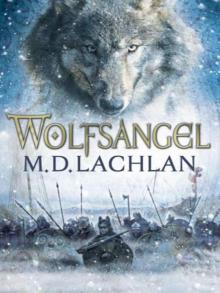 Wolfsangel
Wolfsangel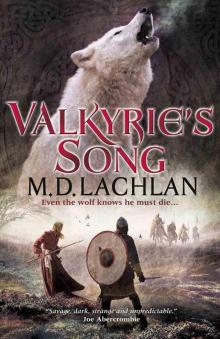 Valkyrie's Song
Valkyrie's Song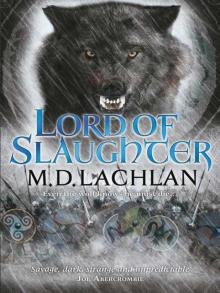 Lord of Slaughter
Lord of Slaughter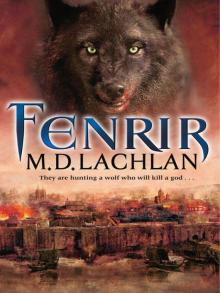 Fenrir c-2
Fenrir c-2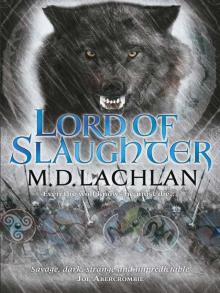 Lord of Slaughter (Claw Trilogy 3)
Lord of Slaughter (Claw Trilogy 3)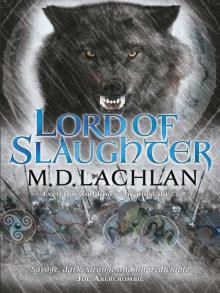 Lord of Slaughter c-3
Lord of Slaughter c-3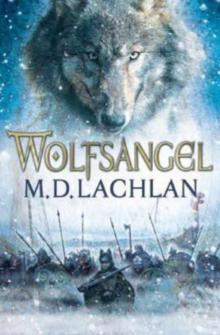 Wolfsangel c-1
Wolfsangel c-1